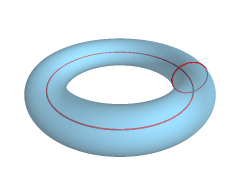|
(2015
midterm assignment) Model Student Midterm answers 2015 (Index) Essay 2: Personal / professional topic |
 |
Michael Bradshaw
A Disturbing Lack of Faith
I
enrolled in Literature of the Future because I am a fan of the science fiction
genre. Who am I kidding? I'm a sci fi nerd. From Verne to Bradbury, from Wells
to Gibson, I've read more on my own time, than I ever have in school. However,
when reading the assignments for this class, I've noticed that nearly all of
them have a dark, dystopian atmosphere about them. Those future that do not end
with an apocalypse, continue with ennui, and the decline of the human spirit
Very few of the readings discussed in class have any faith that humanity's
future will be anything but grim.
The
America of Parable of the Sower, is torn apart by famine, and natural
disasters. Food and water cost thousands of dollars. People lucky enough to be
in walled off enclosures become little island nations unto themselves while
sharks prowl the beaches on two legs. "I hate it. It's like an island surrounded
by sharks except that sharks don't bother you unless you go in the water. But
our land sharks are on the way in. It's just a matter of how long it takes to
get hungry enough." (Sower, 18). Some people become so desperate that they
consider indentured servitude as a viable alternative. Lauren's home is besieged
by the poor and deranged, until, one day, the poor get in. Lauren is forced to
leave her sanctuary, and swim the shark infested waters of the interstate.
The
titular character of Stone Lives, is forced to live on the streets as a
young boy where he gets his eyes carved out of his head "unbearable white-hot
pain when they dug out the eyes of the little urchin they caught watching them
dig up the corpse. But he never cried, oh, no; and so: Stone," (181). He gets
what he thinks is a gift, of his restored sight and a job, only to find out that
the rich play a more subtle version of the same game of survival he played in
the ghetto, only with far greater consequences for losing. It paints a picture
of the cutthroat world of businesses left unchecked, and a disturbingly
plausible glimpse of a future. He learns the person he has to thank for
his gift is the person who caused him to live like an animal for much of his
life. "'Blood of my blood,' she begins, 'closer than a son to me. You are the
only one I could ever trust... Please forgive your abandonment in the Bungle.
It's just that a good education is so important, and I believe you received the
best. I was always watching you." (Stone 201). He only learns this after her
death, at which point he inherits her position. It is unknown whether he
continues where she left off, or if he tried to improve things.
The
Time Machine surmises
that the gaps between the rich and poor will become so wide, that they will
evolve into different species. The rich became Eloi, completely dependent,
and completely unaware of their dependence on the Morlocks, the evolved poor who
kept the Eloi like cattle. The Eloi were little more than children, unable to
fend for themselves, and uncaring about how they are helped to survive. They are
more interested in frivolity, or whatever holds their attention in the moment.
The Morlocks, are ape-like mutants who's eyes have evolved to see in the pitch
black tunnels in which they live, tending to the machinery that keeps the Eloi,
their food source, alive. "Under the new conditions of perfect comfort and
security, that restless energy that with us is strength, would become weakness"
(Wells 51).
None of these novels paint a positive portrait of the future of our species. Will we truly become marauders in the aftermath of disaster? Will we allow ourselves to be placated with technology, while businesses become nations unto themselves with us as their unwitting citizen consumers? Could even achieving the dream of utter peace and security, destroy our urge to create, to improve, to evolve? Or can the human spirit withstand the hardships of the future to become something better than we are, better than what these novels believe we become?
 |
 |
 |
